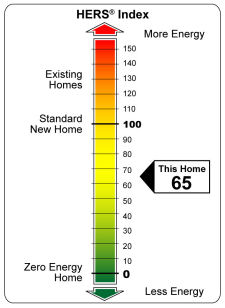HERS Index - What is a Home Energy Rating?
A home energy rating involves an analysis of a home's construction plans and onsite inspections. Based on the home's plans, the Home Energy Rater uses an energy efficiency software package to perform an energy analysis of the home's design. This analysis yields a projected, pre-construction HERS Index.
Upon completion of the plan review, the rater will work with the builder to identify the energy efficiency improvements needed to reduce the HERS Index or to ensure the house will meet certain program guidelines such as ENERGY STAR which are separate from the HERS rating. The rater then conducts onsite inspections, typically including a blower door test (to test the leakiness of the house) and a duct test (to test the leakiness of the ducts). Results of these tests, along with inputs derived from the plan review, are used to generate the HERS Index for the home.
Unlike a Building Performance Audit or a weatherization assessment, a home energy rating is a recognized tool in the mortgage industry. Home energy ratings can be used in a variety of ways in the housing industry. Since a rating quantifies the energy performance of a home, the HERS Index provides an easily understandable means to compare the relative energy efficiency of different homes.
The HERS Index
The HERS Index is a scoring system established by the Residential Energy Services Network (RESNET) in which a home built to the specifications of the HERS Reference Home (based on the 2004 International Energy Conservation Code) scores a HERS Index of 100, while a net zero energy home scores a HERS Index of 0. The lower a home's score, the more energy efficient it is in comparison to the HERS Reference Home.
Each 1-point decrease in the HERS Index corresponds to a 1% reduction in energy consumption compared to the HERS Reference Home. Thus a home with a HERS Index of 85 is 15% more energy efficient than the HERS Reference Home and a home with a HERS Index of 80 is 20% more energy efficient.


To learn more why asking for the HERS Index of a home is the smart way to buy a home click on RESNET HERS Index.
RESNET Energy Smart Builders

RESNET Energy Smart Builders are leading the transformation of the housing towards high energy performance homes. These leading builders are committed to having all of their homes energy rated following RESNET's stringent standards and marketing their homes HERS Index. RESNET Energy Smart Builders build energy efficient homes whose performance has been verified by a certified RESNET Home Energy Rater.
For a listing of RESNET Energy Smart Builders click on RESNET Energy Smart Builders
U.S. Department of Energy’s EnergySmart Home Scale
The EnergySmart Home Scale (E-Scale) was developed by the U.S. Department of Energy (DOE) for the National Builders Challenge. The E-Scale is based on RESNET’s HERS Index. For more information on the E-Scale view a brief video by clicking on E-Scale Video .
DOE has developed an E-Scale Interactive Tool to compare estimated cost and energy savings of new and existing homes. To chart the savings how improving the E-Scale score click on E-Scale Interactive Tool .
Choosing a Rater
As in any trade, all raters are not the same. Raters have different experience, training and skills. You should not select a rater based solely on price. The following are issues to consider when choosing a home energy rater to work with:
- Find out what are the basic services the rater provides. RESNET has adopted a Rating Standards of Practice to define this.
- Determine what training and experience the rater requires to meet your needs. In addition to receiving a rating score, will you require design assistance, HVAC sizing calculations, or construction crew training? Be sure you know that the rater's skills meet your needs.
- Make sure that your rater carries proper insurance coverage. RESNET has arranged to provide affordable and comprehensive general liability and professional liability insurance coverage for raters. Make sure that the rater you hire is properly insured.
Benefits of Hiring a RESNET Member Rater
Choosing a RESNET rater member means that you are selecting someone you can trust to objectively provide you with a comprehensive analysis of the home's major energy systems and components.
RESNET rater members are trained and have demonstrated technical proficiency and have committed to maintain and improve their technical proficiency through continuing education.
Members are committed to conducting ratings in accordance with the RESNET Rating Standards of Practice; abiding by the RESNET Rating Code of Ethics, and disclose any financial interest in the home being rated. Through their membership to RESNET, member raters demonstrate their commitment to technical and ethical quality.








